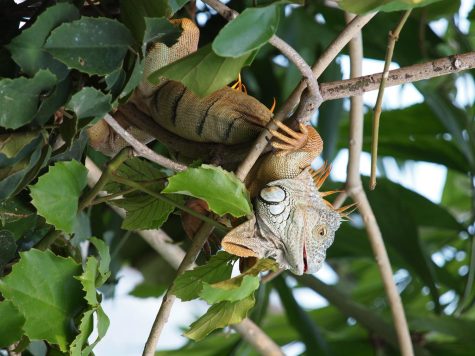Falling Iguanas
Dropping temperatures cause Iguanas to fall from their habitat
January 31, 2022
Is that… a frozen iguana… that fell out of that tree?
Most people are not aware that iguanas live in trees, let alone fall out of them when the temperature drops, but this question is in fact true.
Since most states’ winters consist of harsh snow and below-freezing temperatures, Florida is often a popular destination to go to as the winter season develops. Instead of negative temperatures, Floridians experience weather in the 50s, 60s, and 70s throughout this period of change. Tourists flood to Florida for a warm winter, expecting a nice change of pace; what they do not realize, however, is what is to occur if Florida reaches temperatures in the 30s, as it has been as of recently.
According to the Weather Prediction Center, “much of the state will remain clear and frigid [on the 29th] with the chance for scattered to isolated falling iguanas from trees… that may temporarily paralyze them.” Iguanas, though only paralyzed for a temporary amount of time, do indeed face the unfortunate effects of these subfreezing temperatures. They are cold-blooded reptiles whose heartbeat slows down, and they are unable to control themselves until the temperatures rise the next day. Though the creatures do not die from this occurrence, they will be immobile until they thaw out. This circumstance is one to look out for, as a falling iguana can be a dangerous hazard for one who is not expecting it.

Because Iguanas can range from 2.6-8.8 pounds and are rock solid, they can provide even more damage than anticipated when they are paralyzed. Florida Fish and Wildlife Conservation Commission states that iguanas mainly inhabit areas along the Atlantic Coast, mainly in “in Broward, Martin, Miami-Dade, Monroe, and Palm Beach counties,” so individuals in Jacksonville, Florida should be safe from these falling creatures.








